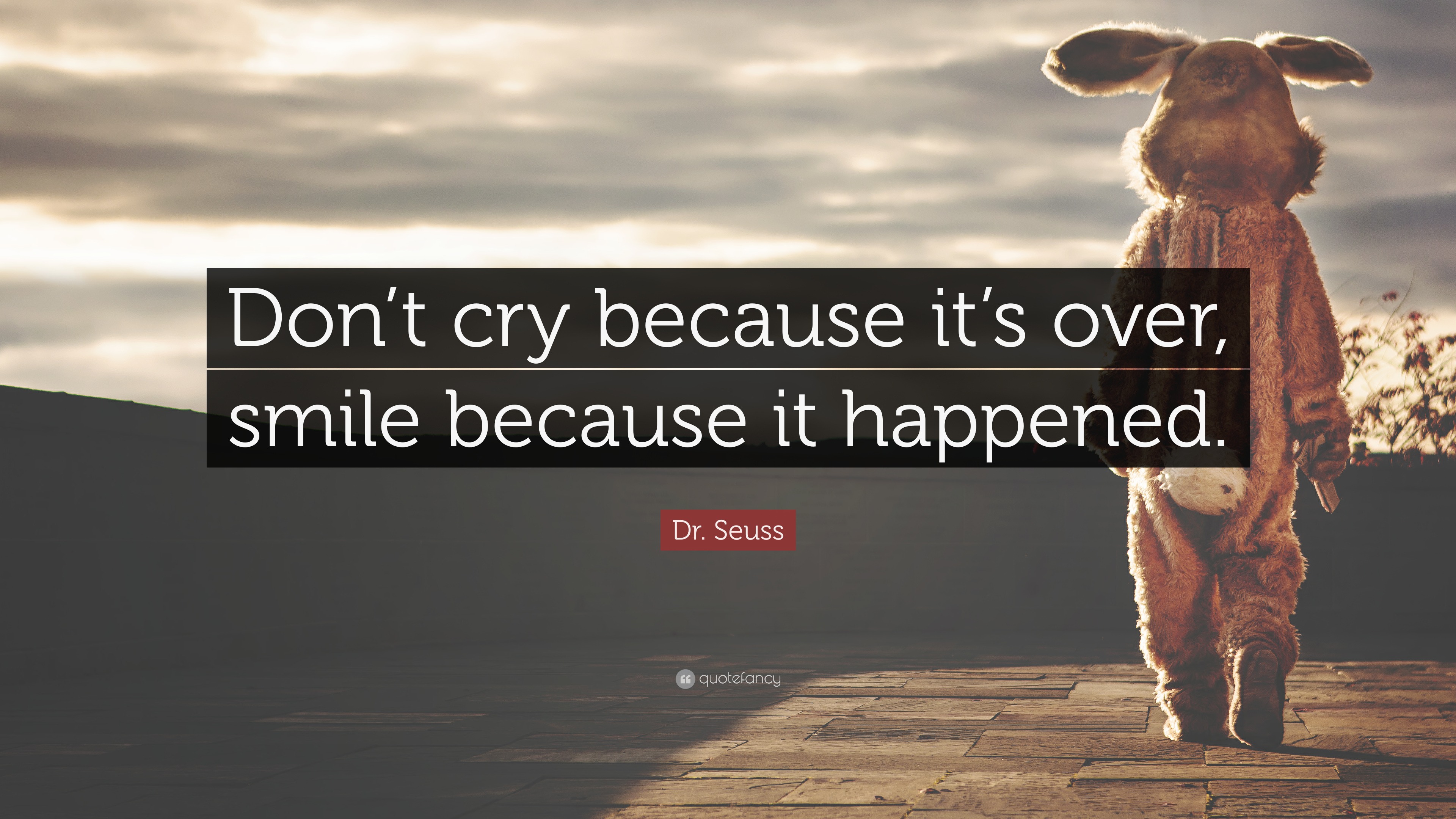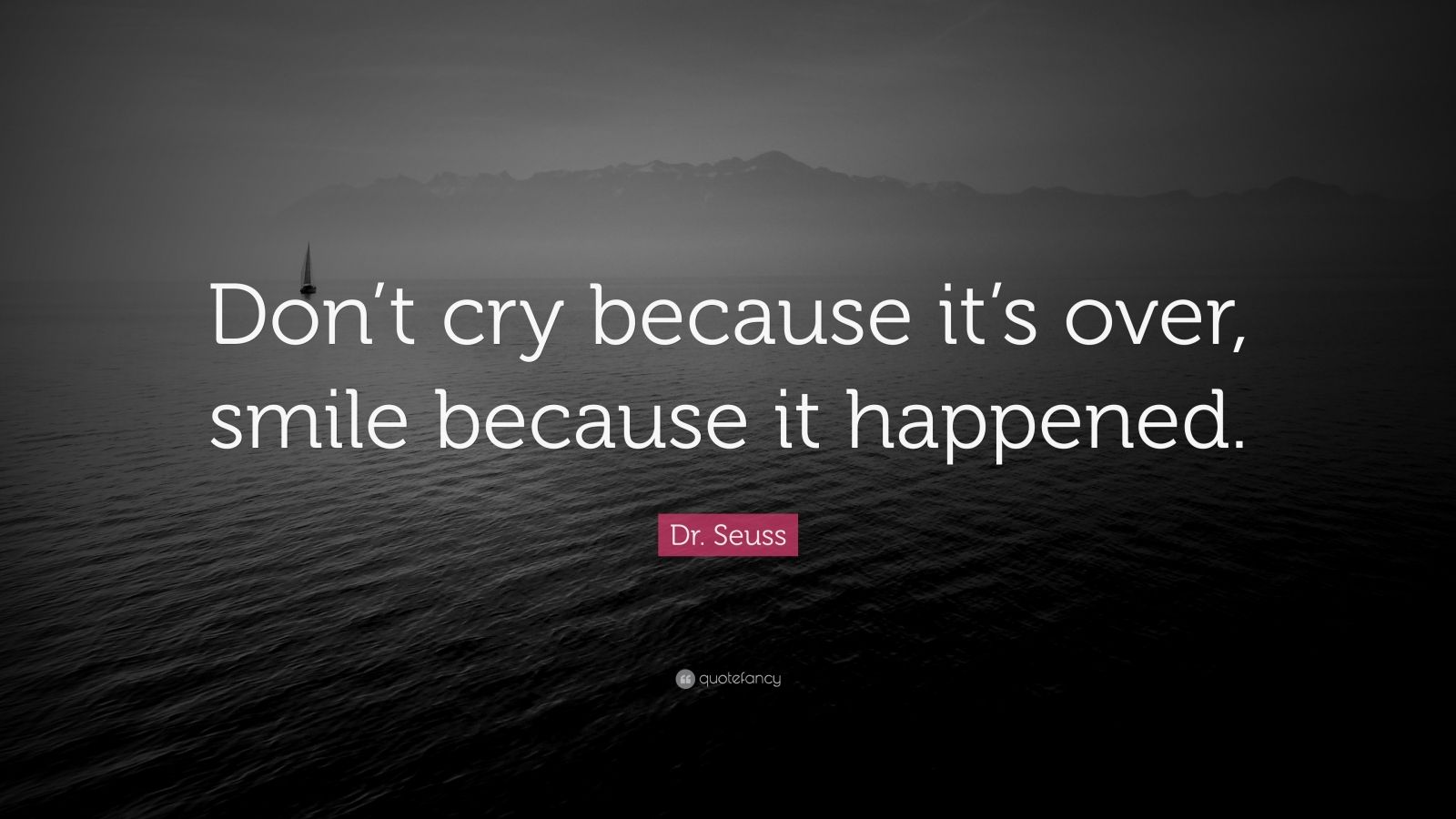In the world we live in today, challenges and adversities are inevitable. However, the phrase "don't cry, smile because it happened" has become a powerful reminder of resilience, gratitude, and positivity. This phrase encourages us to embrace life's difficulties as stepping stones for growth rather than obstacles to despair. It’s not about ignoring pain, but about transforming it into something meaningful. In this article, we will delve deeply into the essence of this philosophy and how it can shape our lives for the better.
The concept of smiling through challenges is rooted in ancient wisdom as well as modern psychological insights. It emphasizes the importance of reframing our perspective when faced with difficult situations. Instead of succumbing to negativity, we are encouraged to find the silver lining and appreciate the lessons that life offers.
As we navigate through this article, you'll discover how adopting this mindset can lead to personal growth, improved mental health, and a more fulfilling life. Let's explore how embracing the philosophy of "don't cry, smile because it happened" can transform your outlook on life.
Read also:Exploring The Fallout 4 Xbox Mod Space A New Frontier For Gamers
Understanding the Philosophy Behind "Don't Cry, Smile Because It Happened"
The Origins of the Phrase
The phrase "don't cry, smile because it happened" draws inspiration from various cultural and philosophical traditions. It reflects the idea that every experience, whether positive or negative, contributes to our personal development. Historically, many ancient teachings emphasize the importance of finding joy even in adversity. For instance, Stoicism, a philosophy originating from ancient Greece, teaches that we should focus on what we can control and accept what we cannot.
Moreover, Eastern philosophies such as Buddhism and Taoism also advocate for embracing life's imperfections and finding peace amidst chaos. These teachings align closely with the core message of the phrase, encouraging individuals to view challenges as opportunities for growth rather than sources of sorrow.
Psychological Perspectives on Resilience
From a psychological standpoint, the concept of resilience plays a crucial role in how we respond to life's challenges. Resilience refers to the ability to bounce back from setbacks and adapt to change. Research has shown that people who practice resilience tend to experience better mental health and overall well-being.
A study published in the *Journal of Positive Psychology* highlights the importance of positive emotions in building resilience. The study suggests that cultivating gratitude and finding meaning in difficult experiences can significantly enhance one's ability to cope with stress. This aligns perfectly with the philosophy of "don't cry, smile because it happened," which encourages us to focus on the positive aspects of our experiences.
Why Should We Smile Through Challenges?
Smiling through challenges may seem counterintuitive, but it has numerous benefits for both our mental and physical health. When we choose to smile, even in the face of adversity, we send a powerful signal to our brain that we are capable of handling the situation. This shift in mindset can lead to a cascade of positive effects.
Research conducted by the *University of Kansas* found that smiling, even when forced, can reduce stress levels and improve mood. The act of smiling triggers the release of endorphins, which are natural mood enhancers. Additionally, smiling can improve our immune system, lower blood pressure, and even increase lifespan.
Read also:Sarah Palin Pics A Comprehensive Look At The Former Governors Iconic Photos
How to Practice "Don't Cry, Smile Because It Happened" in Daily Life
Developing a Positive Mindset
One of the first steps in practicing "don't cry, smile because it happened" is to cultivate a positive mindset. This involves consciously choosing to focus on the good in every situation, no matter how challenging it may seem. Here are some practical tips to help you develop a positive mindset:
- Practice gratitude daily by keeping a gratitude journal.
- Surround yourself with positive influences, such as supportive friends and uplifting content.
- Challenge negative thoughts by reframing them in a more positive light.
Building Emotional Resilience
Emotional resilience is the ability to remain calm and composed in the face of adversity. It involves developing coping strategies that help you navigate through tough times. Here are some ways to build emotional resilience:
- Engage in regular physical exercise to reduce stress and improve mood.
- Practice mindfulness meditation to increase self-awareness and emotional regulation.
- Seek professional help if needed, such as therapy or counseling.
The Science Behind Smiling and Its Impact on Well-being
Smiling is not just a physical expression; it has profound effects on our mental and physical health. Scientific studies have shown that smiling can lead to a variety of health benefits, including reduced stress, improved mood, and enhanced social connections.
A study published in *Psychological Science* found that people who smiled during stressful situations experienced lower heart rates and reported feeling less stressed compared to those who did not smile. This suggests that smiling can act as a buffer against the negative effects of stress.
Real-Life Examples of "Don't Cry, Smile Because It Happened"
Inspirational Stories of Resilience
Throughout history, there have been countless examples of individuals who have demonstrated remarkable resilience in the face of adversity. These stories serve as powerful reminders of the strength of the human spirit and the importance of maintaining a positive outlook.
For instance, the story of Helen Keller, who despite being blind and deaf, went on to become a renowned author and activist, exemplifies the power of resilience. Her ability to overcome immense challenges and achieve greatness is a testament to the philosophy of "don't cry, smile because it happened."
Lessons from Modern-Day Heroes
In our modern world, there are many individuals who have faced incredible hardships yet managed to rise above them. For example, Malala Yousafzai, the youngest Nobel laureate, survived an assassination attempt and went on to become a global advocate for girls' education. Her story inspires countless people around the world to embrace challenges with courage and determination.
Practical Applications of the Philosophy
Implementing the Philosophy in Relationships
Applying the philosophy of "don't cry, smile because it happened" in relationships can lead to stronger and more meaningful connections. By choosing to focus on the positive aspects of our interactions and forgiving past mistakes, we can build healthier relationships based on trust and understanding.
Using the Philosophy in the Workplace
In the workplace, embracing this philosophy can lead to increased productivity and job satisfaction. By viewing challenges as opportunities for growth and learning, employees can develop a more positive attitude towards their work. This, in turn, can lead to improved performance and career advancement.
Challenges and Criticisms of the Philosophy
Addressing the Criticisms
While the philosophy of "don't cry, smile because it happened" has many proponents, it is not without its critics. Some argue that it promotes toxic positivity, where individuals are encouraged to suppress their negative emotions rather than addressing them. However, it is important to note that the philosophy does not advocate for ignoring pain or suffering. Instead, it encourages individuals to acknowledge their emotions while also finding ways to move forward positively.
Conclusion: Embrace the Philosophy and Transform Your Life
In conclusion, the philosophy of "don't cry, smile because it happened" offers a powerful framework for navigating life's challenges with resilience and positivity. By developing a positive mindset, building emotional resilience, and embracing the lessons learned from difficult experiences, we can transform our lives for the better.
We encourage you to take action by implementing the strategies discussed in this article. Share your thoughts and experiences in the comments section below, and don't forget to explore other articles on our site for more insights on personal growth and well-being.
Table of Contents
- Understanding the Philosophy Behind "Don't Cry, Smile Because It Happened"
- The Origins of the Phrase
- Psychological Perspectives on Resilience
- Why Should We Smile Through Challenges?
- How to Practice "Don't Cry, Smile Because It Happened" in Daily Life
- Developing a Positive Mindset
- Building Emotional Resilience
- The Science Behind Smiling and Its Impact on Well-being
- Real-Life Examples of "Don't Cry, Smile Because It Happened"
- Inspirational Stories of Resilience
- Lessons from Modern-Day Heroes
- Practical Applications of the Philosophy
- Implementing the Philosophy in Relationships
- Using the Philosophy in the Workplace
- Challenges and Criticisms of the Philosophy
- Addressing the Criticisms
- Conclusion: Embrace the Philosophy and Transform Your Life

